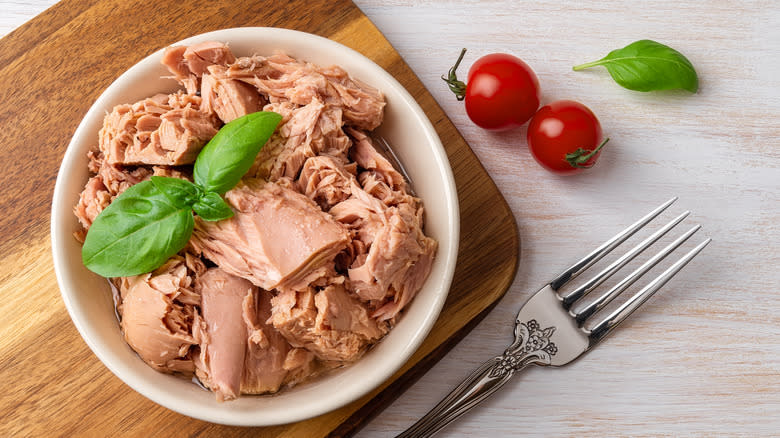Is It Ever A Good Idea To Freeze Canned Tuna?

Canned tuna is one of those staple products that's always there as a backup option. You may not always think about the canned tuna in your cupboard, but it's there when you need it for a cheap, quick, reliable meal. It stays good for a really long time as long as you keep it in a cool, dry area. But you might be thinking, "Why not freeze the tuna so it'll last even longer? That could be a great way to save money."
It turns out that's actually a really terrible idea: both the texture and taste of canned tuna are likely to be badly compromised by the freezing and thawing process. If you're wondering why canned tuna doesn't work as a frozen product when fish tends to freeze so well (in fact, frozen salmon is often as good or better than "fresh" salmon), the answer is simple: water content.
Read more: 11 Mistakes You Didn't Realize You Were Making With Tuna
You Never Want To Freeze Foods With A High Water Content

It turns out the problem here isn't a food safety issue -- canned tuna is still safe to eat -- but a physics-based one. When water freezes, it forms ice crystals and expands. These crystals inevitably press on the cell walls of the product being frozen, causing them to rupture and altering both the taste and texture. This is why you want a fast cooling rate with frozen food: faster freezing leads to smaller ice crystals and less cell wall disruption.
Most food contains at least some water, but the higher the water content, the worse food will be after freezing. This is the reason hard cheese freezes well, but soft cheeses don't; the freezing and thawing of a food with a high water content is going to mess with the texture (though not always necessarily the taste, as it does with tuna) of a soft cheese like brie or camembert. This problem is amplified when you're dealing with something like canned tuna that's literally packed in water. The crystals are going to form in large enough size and quantity that the problem of compromised texture is unavoidable. There's just no way to freeze a can of tuna without it tasting weird on the other side.
Canned Tuna Lasts A Really Long Time Anyway

Let's take a step back and ask why you would even need to freeze canned tuna. It lasts two to five years in your cupboard as it is so long as the can isn't compromised, and if it's gone bad, it is extremely affordable to simply replace -- it retails at Walmart for less than a dollar per can. Freezing may be a great method to preserve a lot of foods, but in the case of canned tuna, why would you need to?
It's good that the lack of any particular reason to freeze canned tuna lines up well with the fact it's not a good idea to freeze it in the first place, because nobody wants messy, funky-tasting fish. While you can and should freeze a lot of different foods (it's a great way to combat food waste), canned tuna is one product to avoid.
Read the original article on Daily Meal.

